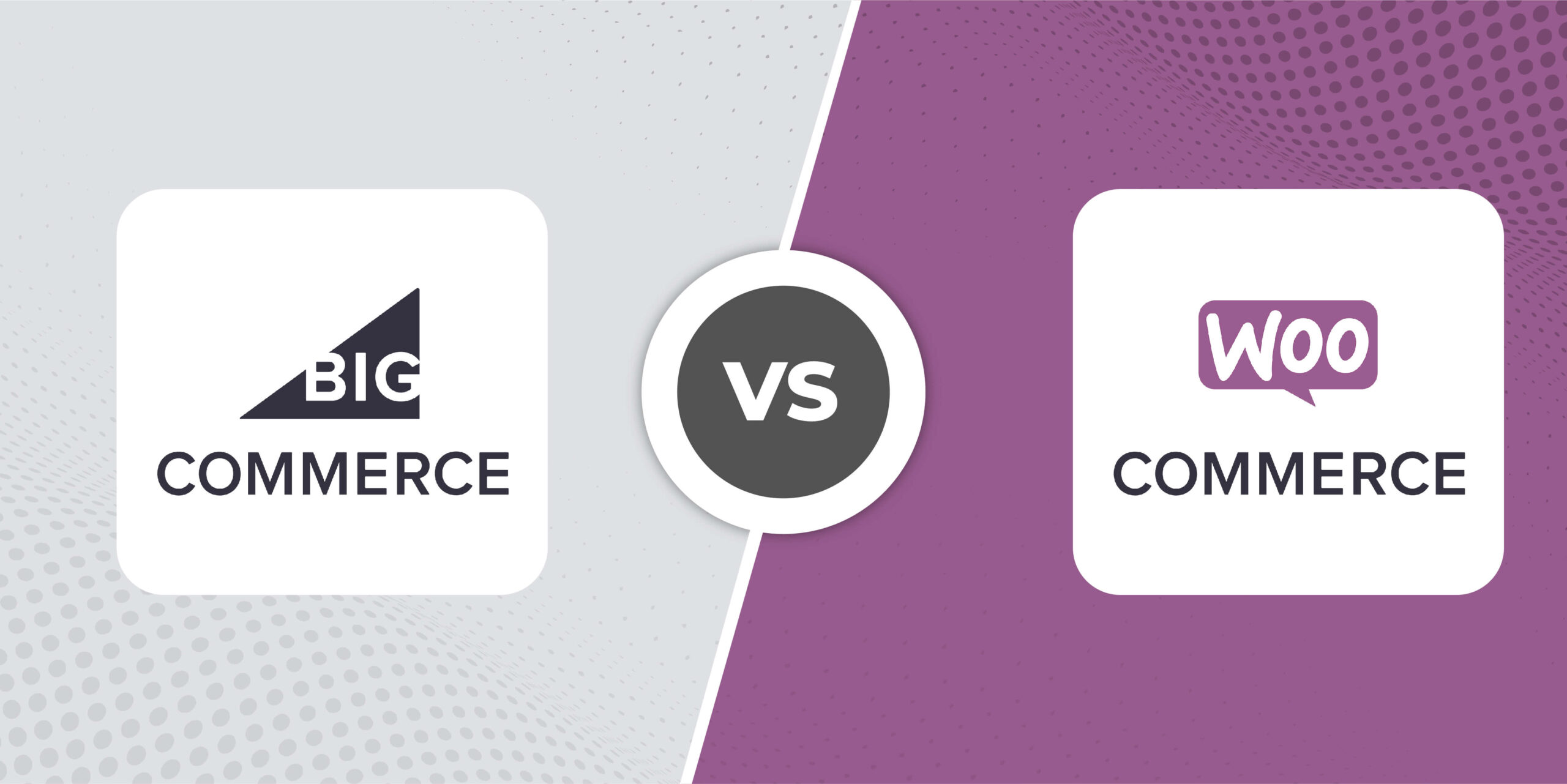
BigCommerce vs WooCommerce
Choosing the right eCommerce platform is important for online businesses. It affects how they appear online, how customers experience their site, and how successful they are. Two popular choices are WooCommerce and BigCommerce. In this article, we’ll look at Bigcommerce vs. Woocommerce, what each platform offers, its flaws, and its pricing. So that you can decide which one suits your business needs best.
What to Look for in Your eCommerce Platform?
Below are the key considerations while choosing an eCommerce platform
- Budget: If you have a budget for starting an online store, calculate the initial cost and future costs, which are reflected in the monthly or yearly subscriptions.
- Payment Methods: Ensure the platform supports the payment gateways you want to use. It is better to choose a platform that supports multiple gateways.
- Scalability: Ensure the platform can scale up as your store grows to meet your needs.
- Ease of Use: Choose an easy-to-use and beginner-friendly platform to quickly manage it.
- Support: Ensure the platform offers reliable support to promptly solve any problems that may arise.
These are the requirements that you must consider when choosing an eCommerce platform. In addition to these considerations, there are other features like managing taxes, invoices, SEO, and shipping.
BigCommerce vs WooCommerce: An Overview
Choosing between these two eCommerce platforms depends on your ease with design and your business requirements. BigCommerce is a website builder, whereas WooCommerce is a WordPress plugin that integrates into your existing website. Both platforms provide templates and storefronts, but they are different in their features. Both options can be suitable if you only consider eCommerce or adding merchandise to your existing business operations.
What is BigCommerce?
BigCommerce is a standalone eCommerce platform that offers a complete package of services needed for your online store. An online store can be easily created by simply purchasing and paying for a subscription. The only drawback is the customizing features, as they have limited tools. An added advantage is that you can create a fully functional BigCommerce store with your existing WordPress site.
Pros:
- Easy setup
- Customizable platform
- Advanced security features
- Plenty of help resources
- Free to use
Cons:
- Plugins slow down performance
- Extensions get expensive
- Only for WordPress
- No all-in-one solution
What is WooCommerce?
WooCommerce is widely recognized as the top eCommerce plugin for WordPress. It lets you easily convert any WordPress blog or website into an online store. To start a WooCommerce store, you must first purchase and set up web hosting. Then, install WordPress along with the WooCommerce plugin and marketing tools. This process might seem difficult, but it’s easier than it appears.
Pros:
- All-in-one platform
- Wide variety of built-in features
- Optimization capabilities
- Competitive Pricing
- Multi-channel sales
Cons:
- Overwhelming options
- It takes time to learn
- Limited customization with free features
BigCommerce vs WooCommerce: Which Suits Your Business?
There’s no particular answer on whether BigCommerce or WooCommerce is better, as they are completely different platforms. It’s important to choose the platform that best suits your business. Below are the factors mentioned to choose them:
1. BigCommerce vs. WooCommerce: Pricing
BigCommerce Pricing:
Firstly, BigCommerce offers a 15-day free trial, so you can try it out before choosing a plan to continue running your online store. There are three main pricing plans, namely Standard, Plus, and Pro. Of all the plans, Plus is the most popular among the users. All the BigCommerce plans don’t have any transaction fees when using major payment gateways like PayPal, AmazonPay, and Stripe. Your website will also get unlimited bandwidth, product variations, file storage, and staff accounts. You’ll receive a 25% discount if you opt for an annual subscription instead of a monthly one. BigCommerce has a limit for total annual sales. You can use premium features to expand annual sales.
WooCommerce Pricing:
WooCommerce is widely known as one of the top WordPress plugins for eCommerce. It’s free to install and has full customization because it’s open-source. To run a WooCommerce store completely, you must pay separately for a domain name, web hosting service, and SSL certificate. So, the total expenses can add up, which changes the initial projection of WooCommerce as an affordable eCommerce solution. WooCommerce can be budget-friendly initially, but managing multiple monthly bills over time can become challenging.
2. BigCommerce vs. WooCommerce: Ease of Use
BigCommerce Ease of Use:
Starting an eCommerce store with BigCommerce is easy. It is a fully hosted platform; you don’t need to set up hosting or install any software. Do not worry about security, backups, or performance issues. Simply sign up for a 15-day trial plan and set up your store quickly. Once the setup is done, you’ll find your BigCommerce dashboard with options to preview your store, add products, and customize settings. For new businesses, BigCommerce offers a free subdomain. If you want to customize your domain name, purchase it from BigCommerce or another domain registrar. If you already have a WordPress site, you can use the BigCommerce WordPress plugin to integrate an eCommerce store easily with WordPress.
WooCommerce Ease of Use:
WooCommerce is different from BigCommerce because it’s not a hosted platform. It needs some technical knowledge compared to BigCommerce. To start a new store with WooCommerce, you must purchase a domain name and a hosting account. Later, you’ll have to install WordPress and then add the WooCommerce plugin. Some hosting providers offer pre-installed WooCommerce, which makes it easy to set up the process. After the setup, you can begin adding products to your online store.
Setting up your online store is just the beginning of WooCommerce. You’ll need to use plugins and extensions to make your store more appealing and functional. You’ll also have to maintain your eCommerce site, which includes managing security and backups, optimizing caching, and performing performance checks. These are essential for keeping your online store running smoothly and securely.
3. BigCommerce vs. WooCommerce: Themes & design
BigCommerce Themes:
Like other hosted solutions, BigCommerce offers users a variety of eCommerce templates. They provide over 100 premium templates ranging from $140 to $399. Additionally, there are 5 free themes available on the BigCommerce Theme Store, allowing you to customize your storefront for free of cost.
WooCommerce Themes:
WooCommerce is highly customizable when it comes to themes. As a plugin for WordPress, it integrates well with the CMS, which benefits the wide range of themes available. Thousands of free and paid themes are available in both the WooCommerce and WordPress theme stores. This platform lets you customize code and content according to your business needs using the WooCommerce HTML/CSS editor.
4. BigCommerce vs. WooCommerce: Apps & Plugins
BigCommerce Apps:
BigCommerce offers over 1000 apps for its users. These apps are divided into a few categories, so you can choose the ones you need. The most popular apps are designed for Analytics, Marketing, and Payments. All plans include open APIs and 99.99% uptime. The Enterprise Plan also offers a headless solution and unlimited API calls. This makes it easier for developers and sellers to succeed in eCommerce.
WooCommerce Plugins:
WooCommerce has more options than BigCommerce for adding features to your store. With WooCommerce, you benefit from WordPress, which offers over 60,000 free plugins and thousands of premium ones. WooCommerce plugins cover categories like store management, payments, and shipping.
5. BigCommerce vs. WooCommerce: Inventory Management
BigCommerce Inventory Management:
BigCommerce has a built-in inventory management system, so you don’t need extra software to operate it. It’s easy to use and helps you track stock and trends for both online and offline stores. BigCommerce is the only platform that lets you sell physical items, digital products, and services without an extra app. You can also connect it with other inventory management apps to access features.
WooCommere Inventory Management:
With WooCommerce, you can do basic tasks like creating inventory reports and updating product changes. However, managing WooCommerce inventory can be difficult, especially when handling more stock. Also, managing large amounts of data can be tough if your inventory keeps growing. You can use inventory management plugins from the WooCommerce store to solve these problems.
6. BigCommerce vs. WooCommerce: Scalability
BigCommerce Scalability:
BigCommerce is a fully hosted solution, so you don’t have to worry about technical stuff like backups, storage, updates, downtimes, or security. When your business grows, you just upgrade your plan, and BigCommerce takes care of the rest. It offers an easy way to grow your business.
WooCommerce Scalability:
WooCommerce is a self-hosted platform. You have to take care of most of the crucial things like managing resources, updates, backups, and security. Many top WordPress hosting companies allow you to upgrade your hosting plan as your website scales. You can use the WP Engine to make WooCommerce hosting easier.
7. BigCommerce vs. WooCommerce: Payment Options
Payment Options in BigCommerce:
BigCommerce provides many payment options for accepting payments. It integrates easily with top payment platforms like PayPal powered by Braintree, CyberSource, Adyen, Authorize.net, Square, and Stripe. Processing fees for debit and credit cards start at 2.59% + $0.49 for each transaction, which reduces as your BigCommerce store scales in numbers. It also supports popular digital wallets such as Amazon Pay, PayPal, Apple Pay, and Masterpass with built-in integrations.
Payment Options in WooCommerce:
WooCommerce comes with built-in PayPal and Stripe payment options. It also supports all major payment gateways with extensions and add-ons, like Authorize.net. Because WooCommerce is open-source, many regional and new payment services have created integrations for it. This means you can find integrations for any payment gateway you want to use.
8. BigCommerce vs. WooCommerce: SEO & Marketing Features
BigCommerce SEO & marketing:
BigCommerce is known for its great built-in SEO features. With BigCommerce, you can do important SEO tasks. Some useful BigCommerce SEO apps are ReloadSEO, avSEO, and ProSEOTracker. All BigCommerce plans include an SSL certificate, and the platform automatically creates 301 redirects when you change a URL. BigCommerce has a built-in blogging option for marketing, and you can use email marketing, SMS marketing, and popups for an affordable price.
WooCommerce SEO & marketing:
Like BigCommerce, WooCommerce helps you to customize meta titles, meta descriptions, and URL slugs, and it’s easy to add image alt texts for better SEO. However, you’ll need to pay for an SSL certificate. A Yoast SEO plugin is well-known for WooCommerce and WordPress and costs $89 per year for the premium version. It has a blogging feature and offers hundreds of marketing plugins through WooCommerce Extensions, which include recovering abandoned carts and integrating with social media.
9. BigCommerce vs. WooCommerce: Security
BigCommerce Security:
BigCommerce is popular because it’s a fully hosted platform that handles security. All plans include SSL certificates for top-level website security. For card transactions, BigCommerce servers are PCI DSS 3.2 certified at level 1, which helps protect against credit card data leaks. Several BigCommerce apps are also available to prevent fraudulent purchases and enhance security.
WooCommerce Security:
With WooCommerce, you need to handle security yourself. You are responsible for having SSL certificates and PCI compliance. To get security and bug fixes, you must update WooCommerce to the latest versions. Back up your store before every update so you can back up your data if something goes wrong. WooCommerce allows you to set up two-factor authentication, which adds another security layer to your website if your password gets into the wrong hands.
10. BigCommerce vs. WooCommerce: Customer Support
BigCommerce Support:
BigCommerce is a fully hosted platform with excellent phone, email, and live chat support, available 24/7. You can contact their support team when you sign up for a free trial. There’s also a community where you can discuss problems or interesting topics and get advice from other users.
WooCommerce Support:
WooCommerce offers limited support options and no personal support. You can get official help from developers only through tickets or emails. However, a large community of users and developers can offer assistance. You can also find FAQs, tutorials, and documentation to help with common issues.
Conclusion
In summary, WooCommerce suits companies with WordPress websites, while BigCommerce is for those looking for a complete eCommerce package. Even though WooCommerce is technically free, you need to consider additional costs for managing your website. BigCommerce offers an all-in-one billing system, which makes it easier to understand your budget from the beginning. We have your back if you want to elevate your online store! At Ayatas Technologies, we specialize in top-notch eCommerce development services to help you build and grow your business. Contact us today to get started and watch your eCommerce business take off!



